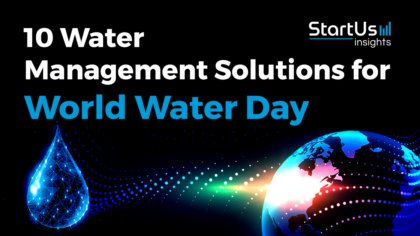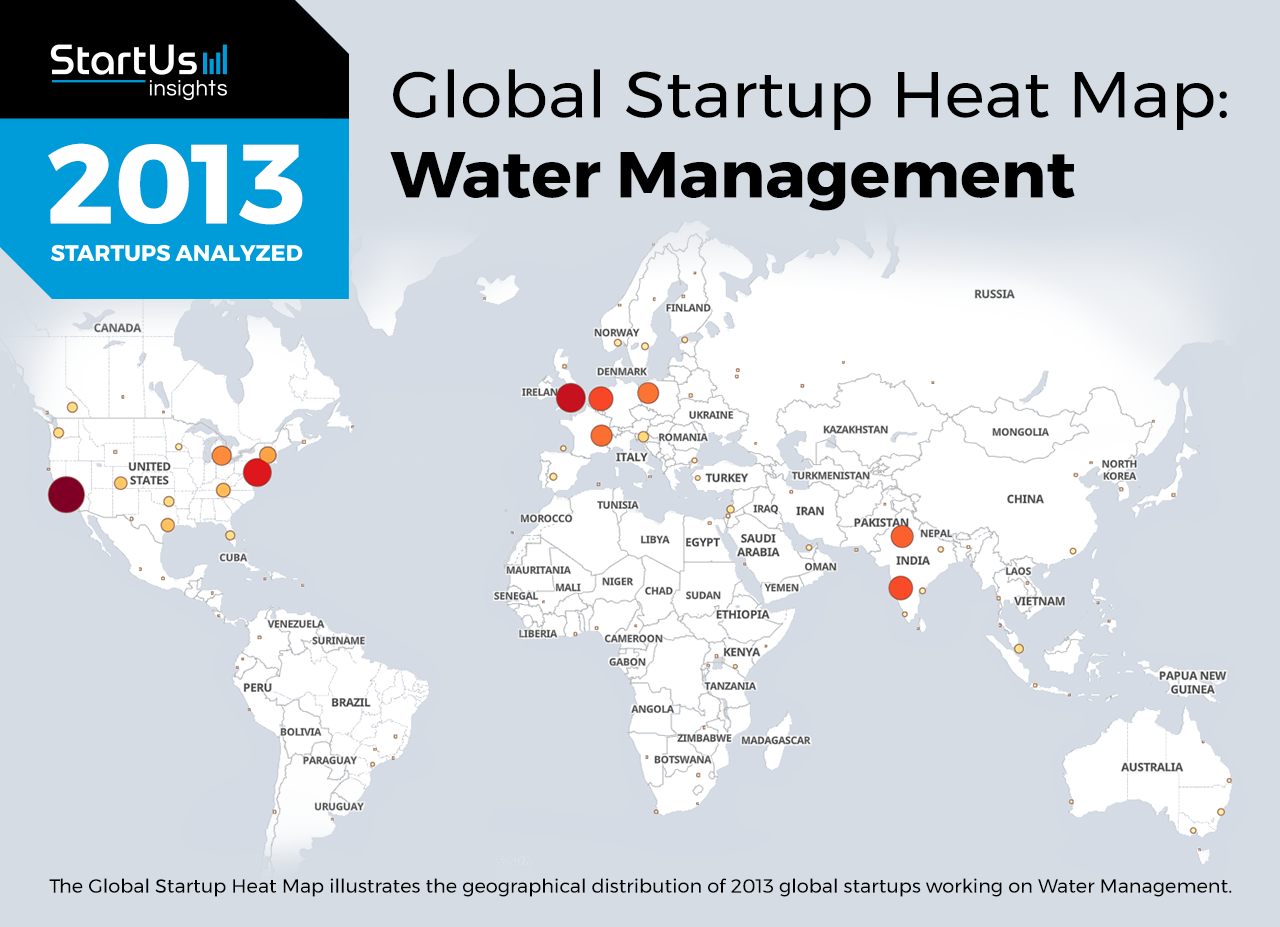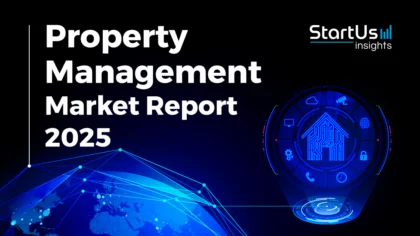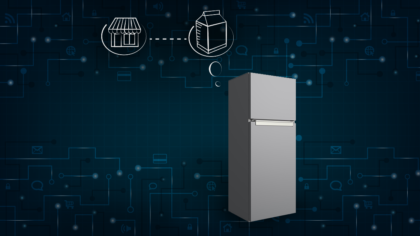Accelerate Productivity in 2025
Reignite Growth Despite the Global Slowdown
On World Water Day, we shed light on startups & scaleups developing innovative technologies that support the goals of the United Nations World Water initiative. You will get to learn about 10 hand-picked water management startups out of 2.000+ we analyzed for this data-driven report.
Global Startup Heat Map highlights 10 Top Water Management Startups & Scaleups out of 2.013
On World Water Day, the insights of this data-driven analysis are derived from the Big Data & Artificial Intelligence-powered StartUs Insights Discovery Platform, covering 1.379.000+ startups & scaleups globally. The platform gives you an exhaustive overview of emerging technologies & relevant startups within a specific field in just a few clicks.
The Global Startup Heat Map below reveals the distribution of the 2.013 exemplary startups & scaleups we analyzed for this research. Further, it highlights 10 water technology startups that we hand-picked based on criteria such as founding year, location, funding raised, and more. You get to explore the solutions of these 10 startups & scaleups in this report. For insights on the other 2.000+ water technology and management solutions, get in touch.
Water & Climate Change
The 2020 edition of the United Nations World Water Development Report, entitled Water and Climate Change, aims to help the water community tackle the challenges of climate change and informing the community about the opportunities that improved water management offers in terms of adaptation and mitigation. Potential responses to climate change, in terms of adaptation, mitigation, and improved resilience are addressed through improving water management. Technology also plays an important role in improving water management by automating water networks, reducing water waste, and enabling water systems to recover from human-induced damage. Numerous startups & scaleups develop solutions that enable the progress of the World Water Day initiative.
1. Optishower builds a Water Management Platform for Hotels
With a growing global population and over-consumption, water supply in cities is becoming a big challenge. Climate change and water scarcity cause a need for smart water management platforms that enable efficient water supply and reduce water consumption. Startups work on solutions that provide accurate up-to-date information to help water distribution companies make informed decisions.
Portuguese startup Optishower develops a sustainable water monitoring and management platform for hotels. Enabling the internet of things (IoT) integration, the platform measures and meters the consumption of water and provides real-time information. The big data generated by connected sensors are then analyzed for smart maintenance and planning. The startup also encourages customers to reduce water use by offering usage-based loyalty points.
2. Urban:eden provides Urban Floodwater Solutions
Climate change caused significant challenges for cities, including the urban heat-island effect, heatwaves, unpredictable heavy storms, and flash floods. Moreover, concrete surfaces heat up faster than the natural landscape. To normalize temperatures in cities, green areas that are adequately supplied with water bodies provide crucial urban cooling. As a result, urban water management solutions that regulate water supply are gaining popularity.
German startup Urban:eden constructs urban wetlands and floodwater cycling paths that consist of modular elements including drainage, concrete, and run-off channels. During heavy rains, the solution leads the rainwater to natural filters in parks or percolates into the ground. This relieves the load on mixed water systems while protecting and restoring water bodies and the natural water cycle.
Groundwater Management
One of the emerging solutions to tackle ground pollution, especially organic pollutants, is bioremediation. Phytoremediation, a subsect of bioremediation, utilizes some plants’ microorganisms to remove pollutants from soil, water, or sediment through degradation, extraction, transformation, or volatilization. Emerging water technology companies are working to scale such soil and ground remediation techniques to eventually recharge groundwater.
3. bio2clean enables Sustainable Groundwater Remediation
Belgian startup bio2clean is developing a sustainable technique for soil and groundwater remediation. The startup employs a phytoremediation technique that utilizes bacteria to further optimize the phytoremediation process. bio2clean currently focuses on improving industrial sites with organic contamination such as oil, benzene, toluene, ethylbenzene, and xylene (BTEX), metal and related contamination, and cyanide, among others.
Stormwater Management
An emerging concept in modern water management involves sustainable urban drainage systems or SUDS. Various innovations spanning biofiltration, soil percolation, and storm surges work in tandem to enable smart drainage systems for cities. Many SUDS mimic natural drainage processes and combine them with advanced automation to further enhance the quality of water resource management.
4. StormHarvester offers Automated Drainage Monitoring
StormHarvester is a British startup offering automated monitoring and control of drainage infrastructure. The startup links civil infrastructure such as valves, pumps, and floodgates, with machine learning-based algorithms to predict overflows. The system then automatically operates the relevant parts of the network to reduce spillages. This solution further enables better utilization of the available water storage within the network.
Smart Irrigation
Being such a vital resource for all living things on our planet, shortages of water due to natural or human-induced events tend to have an outsized impact on some industries. The agriculture sector, especially, faces several challenges related to water, ranging from mismanagement to a lack of availability of water. Emerging AgriTech companies work to develop comprehensive IoT-based solutions to implement precision farming techniques.
5. Smart Water Management Platform (SWAMP) implements Precision Irrigation
Brazillian startup SWAMP offers an IoT-based smart precision irrigation system. The startup optimizes and manages the distribution of water from its source using various channels, including pipes and canals. At the farm-level, SWAMP’s precision irrigation system allows for real-time monitoring of water consumption as well. This solution reduces the wastage of water arising from irrigation while providing crops with ideal conditions for growth. Further, SWAMP is piloting a number of precision irrigation projects in Spain, Italy, and Brazil.
Smart Water Management
Water losses due to leaks in pipes and fittings significantly contribute to unnecessary water shortages, over the long term. As it happens, many such leakages go undetected for a prolonged period of time. This further disrupts the water supply by damaging pipes. In some cases, pipes may also face too much pressure and burst in adverse conditions. Startups are creating various innovative solutions to help water consumers better manage and fix the sources of water waste. In this way, startups address one of the goals of the World Water Day initiative.
6. Phyn offers a Smart Water Leak Detector
US-based startup Phyn is developing its eponymous smart water leak detection and fixture-level monitoring solution. Phyn’s proprietary leak detection technology utilizes high-definition ultrasonic sensors to sample the pressure in plumbing systems 240 times per second. This produces a comprehensive view of the unique signatures of each fixture in the plumbing. Over time, Phyn’s machine learning algortihms refines these fixture profiles and activates an auto-shut-down feature to stop water flow, in case of a leak.
Water Storage
In cities, it becomes essential to manage water to meet the needs of various businesses, households, and large events. All over the world, people associate water storage with tanks and concrete structures. With looming water shortages, innovative storage solutions play a key role in improving both access to and quality of water. Startups are working on solutions that collect and store rainwater for later use.
7. Field Factors creates Circular Urban Water Systems
Dutch startup Field Factors is working on an integrated circular water management solution using its proprietary Bluebloqs system. This modular system combines biofiltration with aquifer storage technologies to treat, store, and reuse rainwater. The storage component of Field Factor’s solution employs infiltration and recovery wells to store water in layers of sand, deep in the subsurface. Later, this water is available for reuse in irrigation or other industrial processes. It is also suitable for sporting venues and public spaces.
Atmospheric Water Generation (AWG)
The use of renewable sources of power to generate water from the atmosphere is more sustainable in comparison to fossil fuels-based generators. Solar farms, for example, offer economies of scale for large AWG projects, reduce their costs, and positively affect climate change as well. Startup and emerging companies, therefore, develop energy-efficient technologies to provide water for remote or inaccessible regions with the help of off-grid renewables.
8. Uravu Labs specializes in Renewable AWG
Indian startup Uravu Labs develops an aqua panel, EVA, that generates water from the atmosphere with the help of solar power. Each square meter of EVA generates 3-4 liters of water per day and functions in conditions with relative humidity as low as 10%. Moreover, this solution helps decentralize the water supply chain and enables water availability for remote locations.
Water Purification
Communities and businesses located in remote areas often have limited access to clean water. To promote water equity, startups develop easily transportable and adaptable water purification systems. Such solutions include water desalination for remote and coastal building projects or groundwater purification systems for rural communities. Water purification also plays a key role in providing several communities with access to clean drinking water, progressing the World Water Day agenda.
9. Remote Waters offers Purification Systems for Remote Areas
Chilean startup Remote Waters caters water purification systems to remote areas providing access to clean and affordable water for communities, governments, and businesses. The startup’s purification system processes both saltwater and groundwater, adapting to seasonal water quality changes. Additionally, the purification unit integrates solar panels and monitoring devices. It increases sustainability and facilitates the easy maintenance of water filtration units.
Wastewater Management
In most cases, secondary wastewater recycling comes into play after a primary one but also occurs as a distinct process. The secondary treatment is associated with removing impurities as well as biodegradable and organic particles from a city’s water discharge based on biofiltration, aeration, oxidation, and use of specific microorganisms to purify water in a sustainable way. Clean water usually serves industrial, agricultural, aquacultural, and municipal needs.
10. BioGill develops Wastewater Treatment Technology
Australian company BioGill produces above-ground, scalable, and modular bioreactors, equipped with patented nanoceramic films, called gills, used for planting active biomass. The company’s technology rests on breeding special microorganisms and utilizing them as natural recyclers for decentralized municipal wastewaters. BioGill’s bioreactors do not require additional aeration since they utilize specific air spacers, vertical loops, and treatment tanks. This further helps reduce the energy costs and amount of sludge from wastewater streams.
Discover more Water Management startups
The 2.003 water management startups other than the examples highlighted in this report focus on marine conservation, underwater drone-based monitoring, and addressing the issues regarding global fishing. While all of these technologies play a major role in progressing the World Water Day agenda, they only represent the tip of the iceberg. To explore more relevant technologies, simply get in touch to let us look into your areas of interest. For a more general overview, you can download our free Industry Innovation Reports to save your time and improve strategic decision-making.



![Explore the Top 10 Waste Management Industry Trends & Innovations [2025]](https://www.startus-insights.com/wp-content/uploads/2025/06/Waste-Management-Industry-Trends-SharedImg-StartUs-Insights-noresize-420x236.webp)




